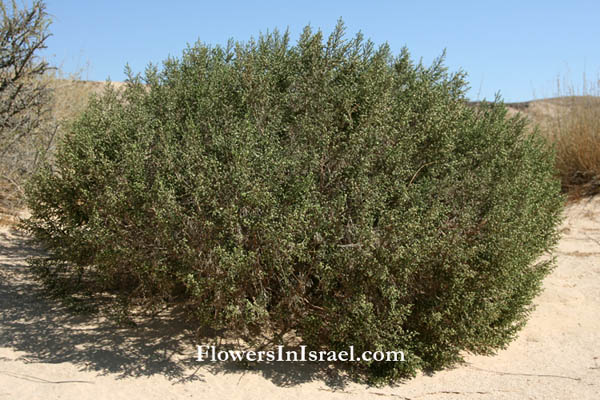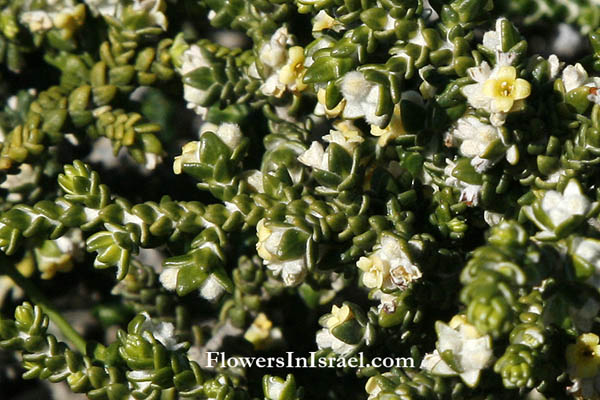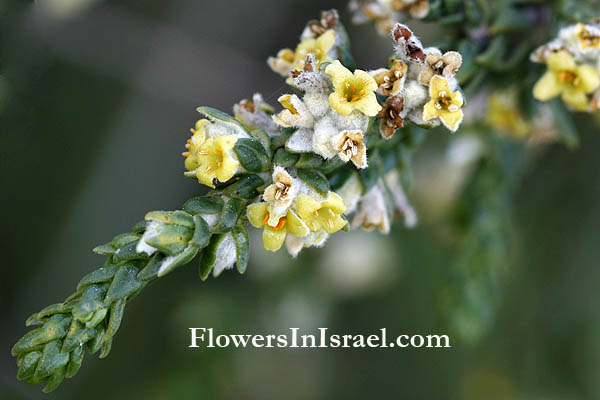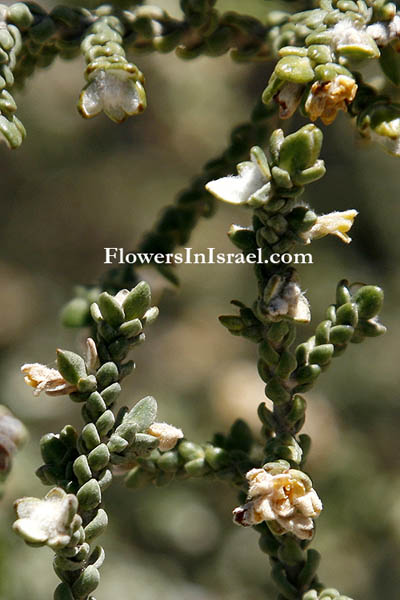Yitran, Shaggy Sparrow-Wort, Spur flax,
Hebrew: מתנן שעיר, Arabic: متنان, Metnan
| Scientific name: | Thymelaea hirsuta (L.) Endl. | |
| Synonym name: | Passerina hirsuta L. | |
| Common name: | Yitran, Shaggy Sparrow-Wort, Spur flax | |
| Hebrew name: | מתנן שעיר, Mitnan | |
| Arabic name: | متنان, Metnan, Mitnan | |
| Plant Family: | Thymelaeaceae, Daphne Family, מתנניים |

|
| Life form: | Phanerophyte, dwarf shrub | |
| Stems: | 40-100cm, with erect, spreading or decumbent, branched stems densely clothed with imbricate leaves; young shoots white-tomentose | |
| Leaves: | Ovate to lanceolate, imbricate, appressed, white-tomentose on adaxial surface, abaxial shining | |
| Inflorescence: | Ebracteate clusters of 2-5 | |
| Flowers: | Yellow, unisexual and hermaphrodite, hypanthium (calyx tube) 3-4mm, densely tomentose; sepals 1mm, broadly ovate, glabrous above | |
| Fruits / pods: | Glabrous, exposed shortly before maturity | |
| Flowering Period: | March, April, May, June, July | |
| Habitat: | Batha, Phrygana | |
| Distribution: | Mediterranean Woodlands and Shrublands, Semi-steppe shrublands, Shrub-steppes, Deserts and extreme deserts | |
| Chorotype: | Med - Saharo-Arabian | |
| Summer shedding: | Perennating |

Derivation of the botanical name: Thymelaea , Greek thymon, θύμον, thyme; and olive, referring to the thyme-like foliage and the small olive-like fruit. hirsuta, rough, shaggy, bristly; hairy. Passerina, Latin passer, a sparrow, as the seeds resemble a sparrow 's beak. Matnan, Yetrim / יתרים The Hebrew name: מתנן, mitnan, New Hebrew of uncertain origin; perhaps from mitna, Aramaic: מיתנא, mitna; Akkadian: matnu, מיתר , meitar= string, tendon, chord.
Samson answered her, If anyone ties me with seven fresh thongs that have not been dried, I'll become as weak as any other man (Judges 16:7). Nogah Hareuveni (founder Neot Kedumim, the Biblical Landscape Reserve in Israel) proposes that the Philistines used fresh fibres from woody branches of the yitran (יתרים) to plait seven new ropes for binding Samson (Judges 16:11). Michael Zohary (1898-1983) suggests that the Arabic name "mitnan" is a cognate of the biblical Mattanah or Matnan (Numbers 21:19), Ethnan (I Chronicles 4:7), Mattenai (Nehemiah 12:19, and Matan (Jeremiah 38:1). Thymelaea hirsuta is growing in desert, sub-desert, sandy habitats of the coastal plain, and marly ground of Mount Carmel. A Bedouin shepherd, knowing that Thymelaea hirsuta is poisonous, might relate that it has no use at all. In some cases eradicating the bushes of Thymeleae hirsuta, for the sheep do not touch it and considering these bushes water thieves, for their deep and widespread roots enable them to deprive the pasture of a great amount of water. The same Bedouin will use Thymelaea hirsuta as a good source of fibers from which strings, thick cords and ropes may be made, for different purposes. In the Negev the Bedouin use the dried inner bark of Thymelaea hirsuta as a tinder by placing a small quantity on a flint stone and igniting the fibres by striking with an iron striker. Thymelaea hirsuta (mitnan) has been used since 1979 as a new fiber source for handmade paper in Beer Sheva, Israel. It was chosen because it is a member of the Thymelaeaceae, which provides bast fiber for hand papermaking in the Orient. Mitnan paper is used primarly by artists, but also by paper conservators for repairing documents and works of art. See the list of Medicinal herbs in Israel, the parts used and their medical uses to treat various diseases. Bible resources:


|